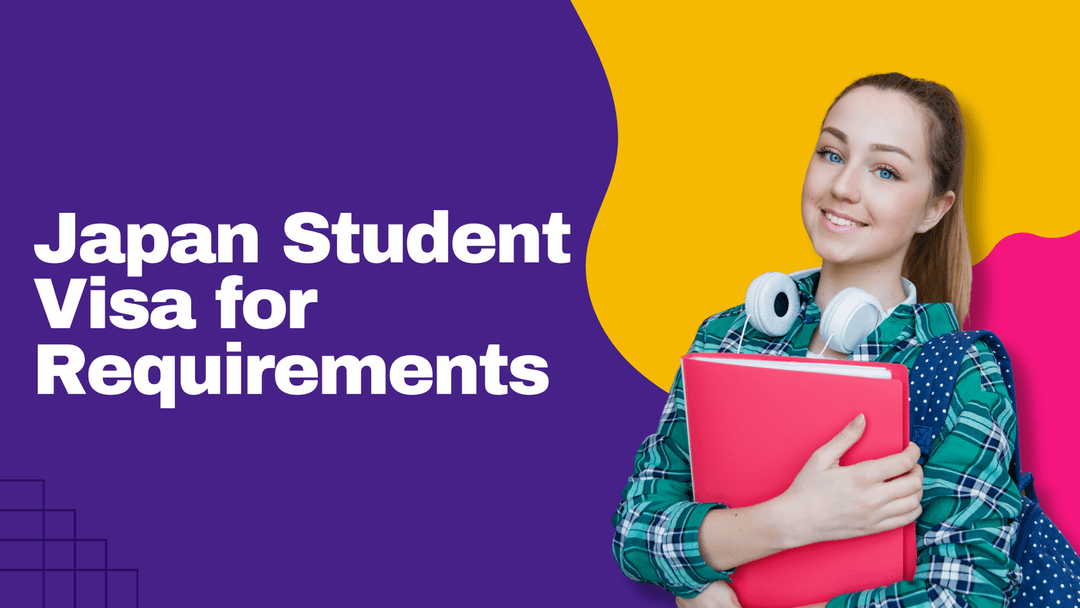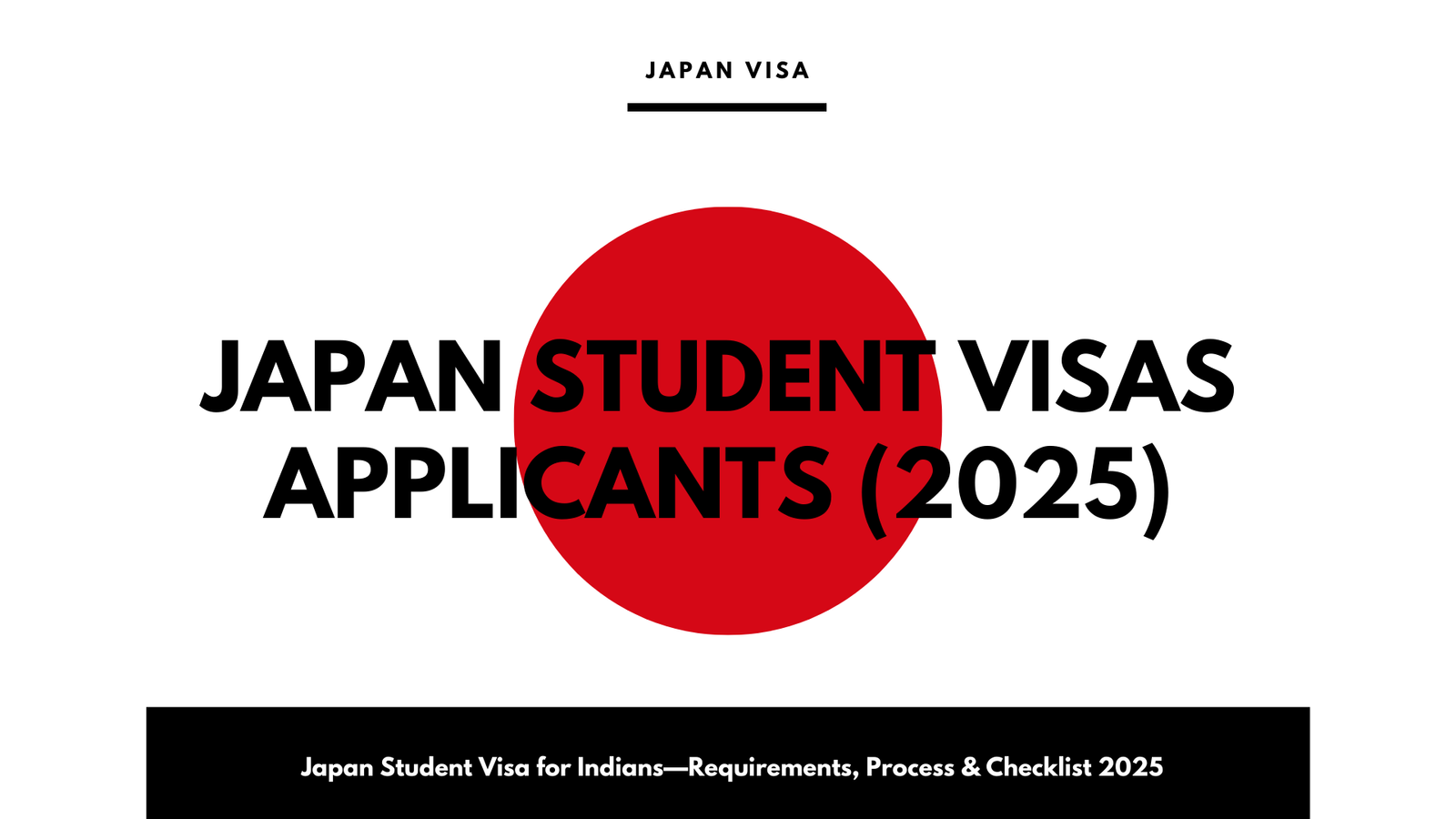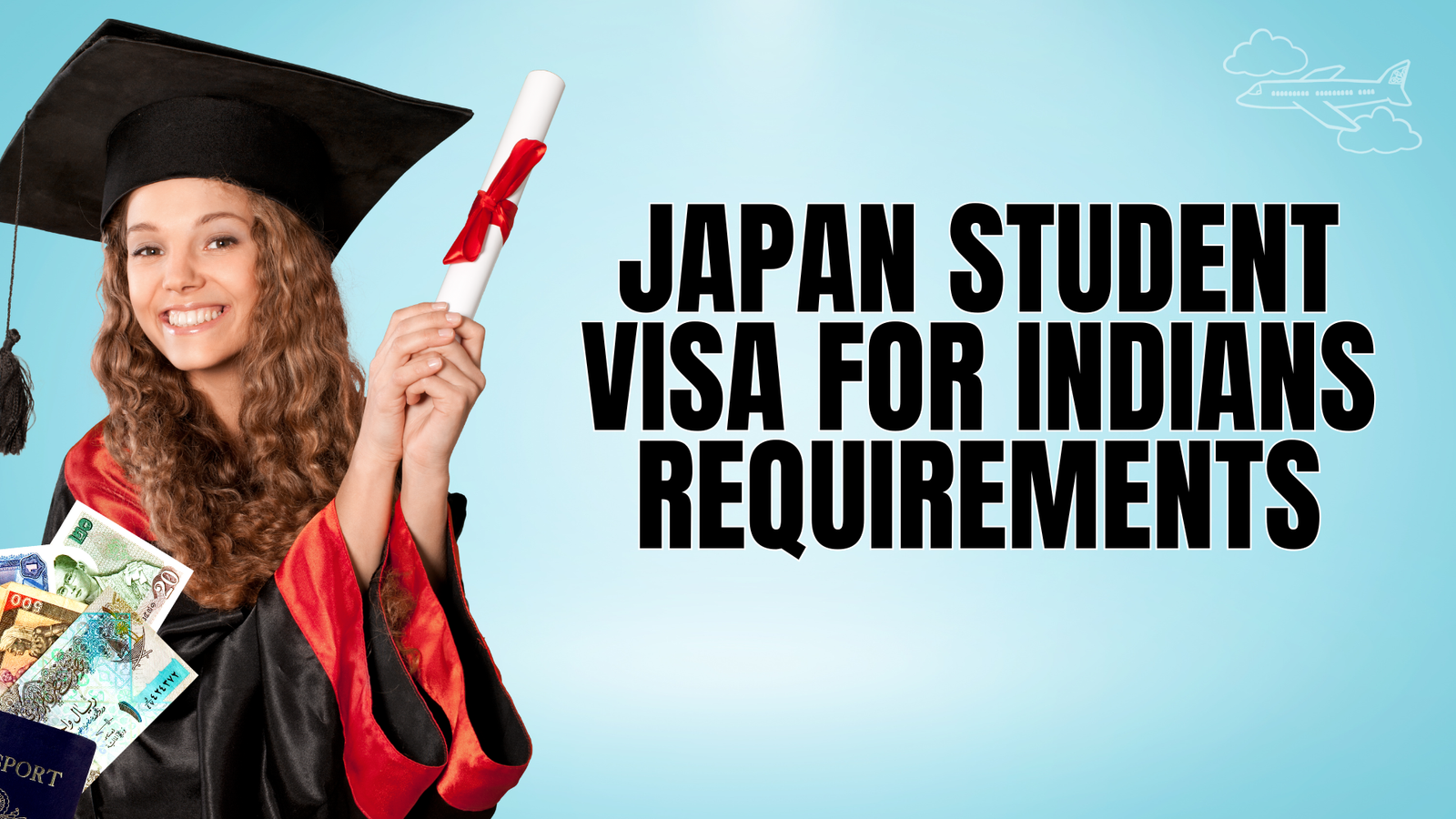
Japan Student Visa for Indians—Requirements, Process & Checklist 2025
Enroll Now
Published: 2025-05-19 12:54:44
Are you an Indian student dreaming of studying in Japan? You’re not alone! Japan has emerged as a top study-abroad destination for Indian students seeking world-class education, advanced technology, and a rich cultural experience.
From Tokyo’s bustling campuses to Kyoto’s serene study environments, thousands of Indian students are now eyeing Japan for its globally ranked universities and affordable tuition fees. In 2025, the demand for a Japanese student visa for Indians is higher than ever, thanks to generous scholarship programs, innovative academic pathways, and Japan's increasing focus on internationalization.
Whether you're planning to study after 12th or pursue a master’s degree, this ultimate guide covers everything you need to know about applying for a Japan student visa from India.
Types of Japan Student Visas for Indian Applicants (2025)
Planning to study in Japan? Great choice! ???????? Whether you're fresh out of school or a university graduate, Japan offers student visa options for every stage of your education.
Let’s break down the different types of student visas available for Indian students in 2025.
Official Website:- Japan Student Visa for indians
1. Japan Student Visa After 12th for Indian Students
Just finished your 12th and looking to study abroad? You can apply for a student visa to join:
- Japanese language schools
- Technical colleges (Senmon Gakkō)
- Vocational training programs
Duration: Up to 2 years
Ideal for students building language skills or pursuing skill-based diplomas before entering university.
Good to Know: Many Indian students choose this route to improve their Japanese before applying to degree programs.
2. Japan Student Visa for Indian Graduates
If you’ve completed your bachelor’s degree in India and want to study further in Japan, this visa is for you.
You can apply to:
- Bachelor's (for a new undergraduate course)
- Master's (Postgraduate programs)
- Doctoral (Ph.D.) programs
Duration: 1 to 2 years (renewable based on the course)
Offered by national, public, and private universities across Japan.
Bonus Tip: Several top Japanese universities now offer English-taught programs, so you don’t always need Japanese proficiency.
3. Short-Term vs Long-Term Student Visas
Short-Term Student Visa (Up to 90 Days)
- For short courses like
- Language crash courses
- Summer exchange programs
- Internships
- No CoE (Certificate of Eligibility) needed
- Cannot be extended or converted to a long-term visa while in Japan
Perfect for trial learners or cultural immersion programs.
Long-Term Student Visa (6 Months to 4 Years)
- For formal education:
- Language schools
- Colleges and universities
- Requires a Certificate of Eligibility (CoE) from your chosen institution
- Can be extended based on course duration and academic progress
This is the most common visa that Indian students apply for to pursue full-time education in Japan.
Summary Table
| Visa Type | Duration | Best For | CoE Required |
| After 12th Visa | Up to 2 Years | Language schools, vocational study | ✅ Yes |
| Graduate Visa | 1–2 Years | Bachelor’s, Master’s, PhD programs | ✅ Yes |
| Short-Term Study Visa | Up to 90 Days | Workshops, language crash courses | ❌ No |
| Long-Term Student Visa | 6 Months–4 Years | Full-time academic programs | ✅ Yes |

Japan Student Visa Requirements for Indian Citizens
If you’re an Indian student planning to study in Japan, getting your visa application right is crucial. To help you breeze through the process, here’s a simple and clear checklist of all the important documents you’ll need for your Japan student visa application in 2025.
1. Valid Indian Passport
Make sure your passport is current and valid for the entire duration of your study in Japan. An expired or soon-to-expire passport can delay your visa process.
2. Recent Passport-Size Photographs
You will need two recent passport-sized photos (usually 45mm x 45mm) with a plain white background. These photos must be clear and match the specifications provided by the Japanese embassy or consulate.
3. Completed Japan Student Visa Application Form
Fill out the visa application form carefully and accurately. Any errors or missing information can cause delays or rejection. You can download the form from the official Japanese embassy or the VFS Global website.
4. Certificate of Eligibility (CoE)
The Certificate of Eligibility is a crucial document issued by your Japanese educational institution after they submit your admission details to the immigration authorities in Japan. This certificate confirms that you meet the requirements for a student visa and must be submitted with your application.
5. Academic Mark Sheets and Certificates
Provide your complete academic records, including mark sheets, diplomas, or certificates from previous schools or universities. These prove your educational qualifications to the Japanese authorities.
6. Birth Certificate
A government-issued birth certificate is often required as proof of identity and date of birth. Make sure to carry an original or certified copy.
7. Admission Letter from the Japanese Institution
Include the official acceptance or admission letter from the university, language school, or vocational institution where you plan to study. This document confirms your enrollment.
8. Proof of Language Proficiency
Depending on your course, you may need to show proof of your language skills. For example:
- JLPT (Japanese Language Proficiency Test) for courses taught in Japanese
- IELTS or TOEFL scores for English-taught programs
9. Proof of Financial Support
You must demonstrate that you have sufficient funds to cover tuition fees, living expenses, and other costs during your stay. This can be shown through
- Bank statements (last 6 months)
- Affidavit of support from parents or sponsors
- Scholarship award letters (if applicable
Click Website for:- Japan Student Visa Requirements
Step-by-Step Japan Student Visa Process for Indian Students
Planning to study in Japan? Getting your student visa is a crucial step, but don’t worry —we’ve broken down the entire process into simple, easy-to-follow steps to help you apply smoothly.
1. Secure Admission in a Japanese Institution
First, you need to get accepted by a recognized university, college, or language school in Japan. This admission letter is essential because without it, you cannot apply for the visa. Make sure your chosen school is approved by the Japanese government.
2. Obtain the Certificate of Eligibility (CoE)
Once admitted, your Japanese school will apply to the Immigration Services Agency of Japan for a Certificate of Eligibility (CoE) on your behalf. The CoE is a vital document that confirms you meet the requirements to enter Japan as a student. It usually takes about 1 to 3 months to be issued.
3. Gather All Required Documents
Prepare all necessary documents carefully, including your valid passport, completed visa application form, admission letter, CoE, academic transcripts, financial proof, and photos. Double-check that everything is complete and accurate to avoid delays.
4. Apply for the Visa Through VFS Global India
Submit your Japan student visa application at the nearest VFS Global center in India. VFS is the authorized visa processing partner, and they handle your documents and application on behalf of the Japanese embassy or consulate.
5. Pay the Visa Processing Fee
You’ll need to pay the visa fee, which varies depending on the type of visa. For student visas, fees typically range from ₹550 to ₹2050. Keep the payment receipt safe, as you may need to show it during your application.
6. Submit Biometrics (If Required)
In some cases, Indian applicants might be asked to provide biometric data such as fingerprints or a photograph at the visa application center. This depends on the consulate’s requirements and is usually communicated beforehand.
Japan Student Visa Documents Checklist for Indian Students (2025)
Preparing your documents carefully is the key to a smooth Japan student visa application. To help you stay organized, here’s a clear, easy-to-follow checklist of all the important papers you’ll need:
Valid Passport
Make sure your passport is current and valid for at least 6 months beyond your planned stay in Japan.
Completed Visa Application Form
Fill out the official Japan student visa application form carefully with accurate details. Double-check spelling and dates.
Passport-sized Photographs (45mm x 45mm)
Provide two recent, clear photos with a white background. The size must be exactly 45mm by 45mm.
Certificate of Eligibility (CoE)—Original and Copy
This essential document is issued by your Japanese educational institution and confirms your admission and eligibility.
Admission Letter from the Japanese School or University
Attach the official acceptance letter or enrollment certificate from your chosen institution.
Academic Documents
Include your mark sheets, transcripts, certificates, and any other relevant education records.
Proof of Financial Support
Show bank statements or financial documents proving you can cover tuition fees and living expenses during your stay.
Language Proficiency Certificate
Provide your JLPT (Japanese Language Proficiency Test) certificate or English test scores (IELTS/TOEFL), if required.
Birth Certificate
Include your birth certificate as an official identity document.
Sponsorship Letter (if applicable)
If someone else is funding your education, include a notarized sponsorship letter and their financial proof.

Financial Requirements for a Japanese Student Visa
When applying for a Japanese student visa, one of the key steps is to demonstrate that you have enough funds to cover both your tuition fees and living expenses during your stay in Japan. This helps the authorities ensure that you can support yourself without financial difficulties while studying.
1. Bank Statements (Last 6 Months)
You must submit bank statements showing a stable and sufficient balance, usually between ₹8 lakh to ₹10 lakh or more. These statements should clearly reflect your financial capacity to cover tuition, accommodation, food, travel, and other daily expenses for the entire duration of your studies in Japan.
2. Affidavit of Support
If someone else, like your parents or guardian, will sponsor your education, you need to provide an affidavit of support. This legal document states that the sponsor takes full financial responsibility for your education and living costs in Japan. It adds credibility and strengthens your visa application.
3. Scholarship Proof (If Applicable)
If you have received a scholarship or financial aid for your studies, include the official scholarship award letter or certificate. This proof not only reduces your financial burden but also boosts your chances of visa approval. Scholarships are widely available for Indian students and can significantly help with tuition and living expenses.
Japan Student Visa Interview Process for Indian Applicants
The Japan student visa interview for Indian applicants is brief, focused, and assesses study intentions clearly.
Is an interview mandatory?
For Indian students applying for a Japanese student visa, an interview is usually not mandatory. Most applicants get their visas approved based on the submitted documents alone. However, in some cases, the Japanese embassy or consulate may request an interview if they need additional information or want to clarify certain details.
Common Interview Questions You Might Face
If you are called for an interview, here are some frequently asked questions to help you prepare:
- Why did you choose Japan for your studies?
The officers want to know your genuine reasons for selecting Japan—whether it's the quality of education, interest in Japanese culture, or future career goals.
- What is your study plan after arriving in Japan?
Be clear about your course details, duration, and what you aim to achieve during your stay.
- Who is funding your education?
You should confidently explain how your tuition fees and living expenses will be covered—whether by your parents, scholarships, or loans.
- Do you plan to return to India after your studies?
This question tests your intent. It's important to reassure them that you respect visa rules and have plans for your future back home or a legal stay.
Language Proficiency and Education Requirements
When applying for a Japan student visa, proving your language skills is an important step, but the requirements can vary depending on your course and institution.
JLPT (Japanese Language Proficiency Test)
If you are enrolling in a Japanese language school or vocational college, many programs require you to have cleared the JLPT N5 or N4 level. These levels show that you have basic Japanese communication skills, which help you adapt to daily life and study in Japan.
IELTS and TOEFL Requirements
For university programs taught in English, some schools ask for an IELTS score of 5.5 or above or a TOEFL iBT score of around 60 or more to ensure you can follow the coursework effectively.
However, if your program is primarily taught in Japanese, you often do not need IELTS or TOEFL scores. This means many Indian students can apply for a Japan student visa without IELTS, making it more accessible to those who have strong Japanese language skills but have not taken English proficiency tests.
Japan Student Visa Processing Time & Fees (2025)
If you’re applying for a Japan student visa in 2025, it’s important to know how long the process takes and what fees you need to pay. Here’s a simple breakdown to help you plan your application smoothly.
Processing Time
Typically, the processing time for a Japanese student visa is around 4 to 7 working days after you submit your complete application. This timeframe may vary slightly depending on the volume of applications or additional verification requests by the embassy or consulate.
Tip: To avoid delays, make sure your documents are complete and correctly filled out before submission.
Visa Fees for Indian Students
The visa fee depends on the type of visa you are applying for:
- Single Entry Student Visa: ₹550
- Multiple Entry Student Visa: ₹1,500
- Transit Visa: ₹300 to ₹500
Note: Visa fees are subject to change, so it’s always best to confirm the latest fee details on the official VFS Global website or the Japanese Embassy before you apply.
Quick Tips to Save Time & Money
- Apply at least 3 months before your course starts to avoid last-minute rush fees.
- Pay your visa fee exactly as required to prevent any payment issues.
- Use VFS Global Japan for easy and reliable visa submission from India.
By understanding the processing timeline and visa fees upfront, you can plan your journey to study in Japan with confidence and peace of mind.
Part-Time Work Rules for Students in Japan
If you’re planning to study in Japan, you might be wondering if you can work part-time while you study. The good news is — yes, international students in Japan can work part-time to help cover living expenses, but there are clear rules you must follow to stay legal and safe.
How many hours can you work?
During the school term, you are allowed to work up to 28 hours per week. This limit helps ensure your part-time job doesn’t interfere with your studies.
During school vacations (like summer or winter breaks), you can work up to 40 hours per week, giving you more flexibility to earn extra income.
What’s the Special Work Permit?
Before starting any part-time job, you need to apply for a special permission called Shikakugai Katsudo Kyoka (資格外活動許可)—this means “permission to engage in activities outside your visa status.”
You can apply for this permit at your local immigration office in Japan once you arrive. It’s quick and necessary; working without it can lead to serious penalties or visa cancellation.
Where Can’t You Work?
There are strict restrictions on the type of jobs international students can do. You cannot work in places
Health Insurance Requirements for Students
If you’re planning to study in Japan, one important thing to know is that you must enroll in Japan’s National Health Insurance (NHI) program once you arrive. This health insurance is designed to help students and residents cover medical expenses at affordable rates.
Why is Health Insurance Important for Students?
Healthcare in Japan can be expensive without insurance. By joining the NHI, you get access to medical care at a much lower cost, typically paying only 30% of the actual medical fees. This means if you get sick or need treatment, you won’t have to worry about huge bills.
How to Enroll in National Health Insurance (NHI)?
- Register at your local city or ward office within 14 days of arriving in Japan.
- Bring your residence card, passport, and student ID or certificate of enrollment.
- The staff will help you complete the enrollment process on the spot.
What Does It Cost?
The monthly premium for the National Health Insurance usually ranges between ¥1,500 to ¥2,000, depending on your city of residence and income status. This cost is very affordable compared to private health insurance options.
Important Tips for Students
- Always carry your NHI card with you—it’s needed whenever you visit a hospital or clinic.
- If you leave Japan temporarily, notify the city office to pause your insurance.
- NHI coverage includes hospital visits, prescription medicine, and even dental care in many cases.
Visa Extension and Post-Study Opportunities for Indian Students in Japan
Extend your student visa smoothly and explore work or permanent residency opportunities after graduation in Japan.
How to Extend Your Japan Student Visa
If you want to continue your studies in Japan beyond your current visa period, you need to apply for a visa extension. This process is straightforward:
- Visit the local immigration office in Japan before your current visa expires.
- Submit your updated academic transcripts or enrollment certificate showing you are still enrolled.
- Provide proof of sufficient financial support to cover your tuition fees and living expenses.
- Fill out the visa extension application form and pay the required fee.
Applying early is important — ideally, start the process 1 month before your visa expires to avoid any interruptions in your stay.
Post-Study Visa Options: Work and Permanent Residency Pathways
Finishing your studies in Japan opens up exciting opportunities to build your career and life there.
Switching to a Work Visa
- After graduation, you can apply to change your student visa to a work visa if you have a job offer from a Japanese company.
- Popular work visa categories for international graduates include engineer/specialist in humanities/international services.
- This visa allows you to work full-time and live in Japan for 1 to 5 years, depending on the contract.
Applying for Permanent Residency (PR)
- If you decide to settle in Japan for a long time, you can apply for permanent residency after continuously living there for several years (usually 3 to 5 years).
- Requirements include steady employment, paying taxes, and contributing to social insurance.
- Having a work visa first is typically required before applying for PR.
Japan Student Visa Success Rate & Rejection Reasons
Japan student visa success rate for Indians is around 85–90%; rejections are often due to incomplete documents.
What is the success rate for India’s Japan student visa in 2024?
Good news! The Japan student visa success rate for Indian applicants is quite high, standing at around 85% to 90% in 2024. This means most students who carefully prepare their documents and meet the eligibility criteria get their visa approved without much hassle.
Common Reasons Why Japan Student Visa Applications Get Rejected
Even with a good success rate, some applications get rejected. Here are the main reasons to watch out for:
- Incomplete Documents: Missing or incorrect paperwork is the top cause of rejection. Make sure you submit all required forms, certificates, and proof of funds.
- Financial Issues: If you can’t clearly prove you have enough money to cover tuition and living expenses, your visa may be denied.
- Language Barriers: Lack of proof of basic Japanese or English proficiency can cause doubts about your ability to study effectively.
- Unclear Study Plan or Suspicious Documents: Immigration officials want to be sure you genuinely intend to study in Japan. Fake documents or vague future plans raise red flags.
Frequently Asked Questions (FAQs)
Q1. Can Indian students apply for a Japanese student visa without IELTS?
Yes, many programs—especially those taught in Japanese—do not require IELTS.
Q2. What is the processing time for a Japanese student visa in India?
Typically 4–7 working days after document submission at VFS.
Q3. Can I work part-time while studying in Japan?
Yes, up to 28 hours/week during academic sessions with the proper work permit.
Q4. Is the CoE compulsory for a Japanese student visa?
Yes, the Certificate of Eligibility (CoE) is a mandatory document issued by your Japanese institution.
Q5. What is the visa success rate for Indian applicants?
The success rate is high, around 85–90% if all requirements are met.
The process of applying for a Japan student visa for Indians in 2025 is easier than ever if you plan early and follow each step correctly. With clear documentation, a strong academic plan, and sufficient funds, your dream of studying in Japan is achievable.
Don’t wait for deadlines—apply at least 3 months before your intake begins to avoid any last-minute issues.
